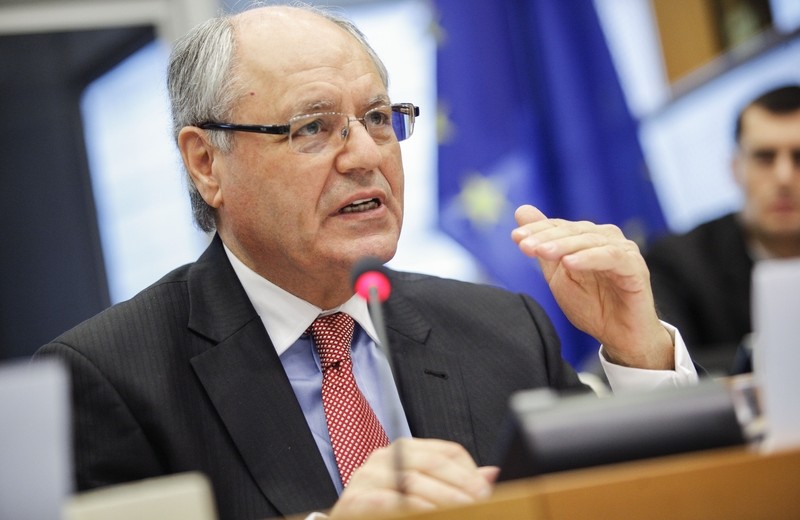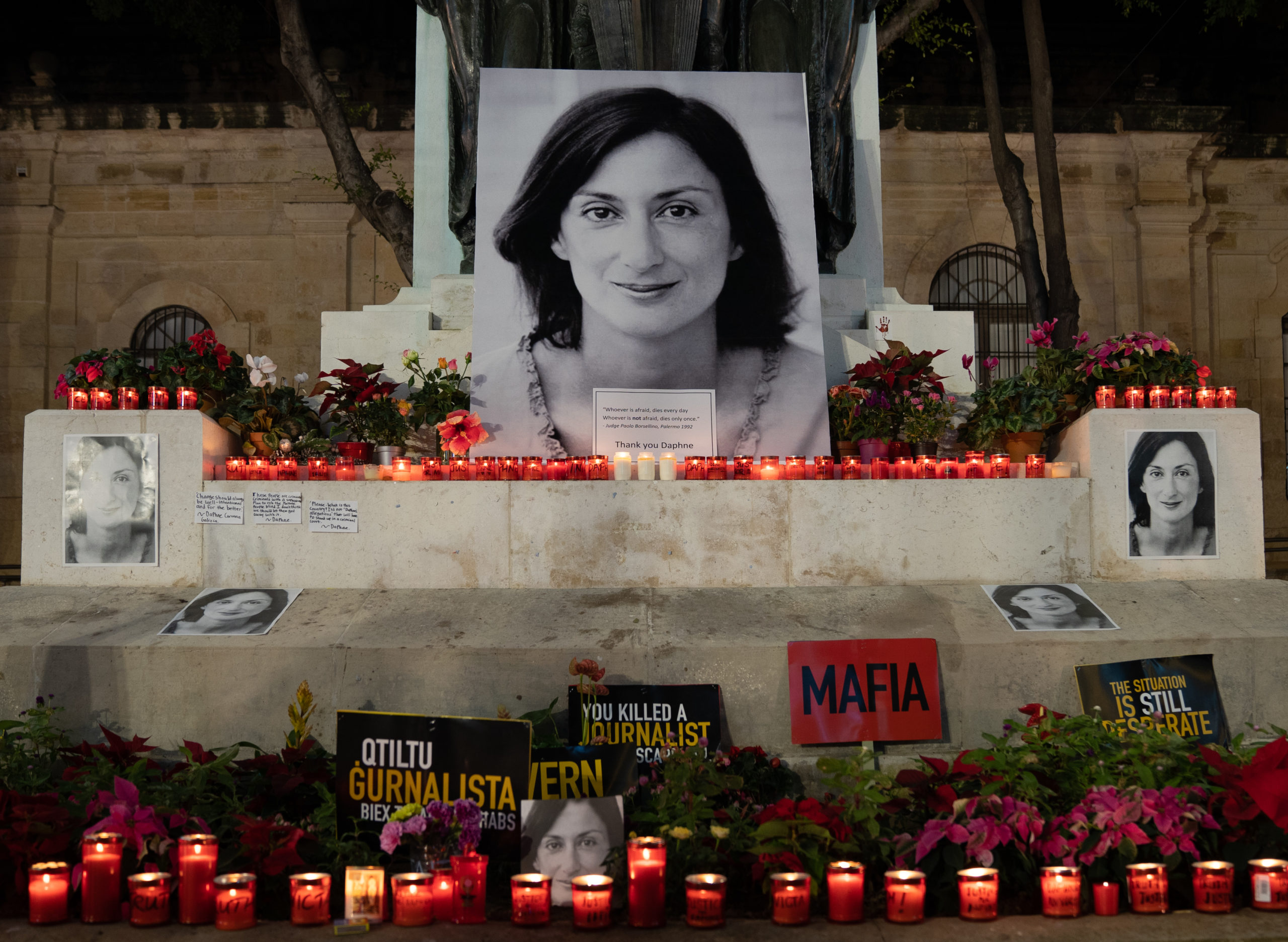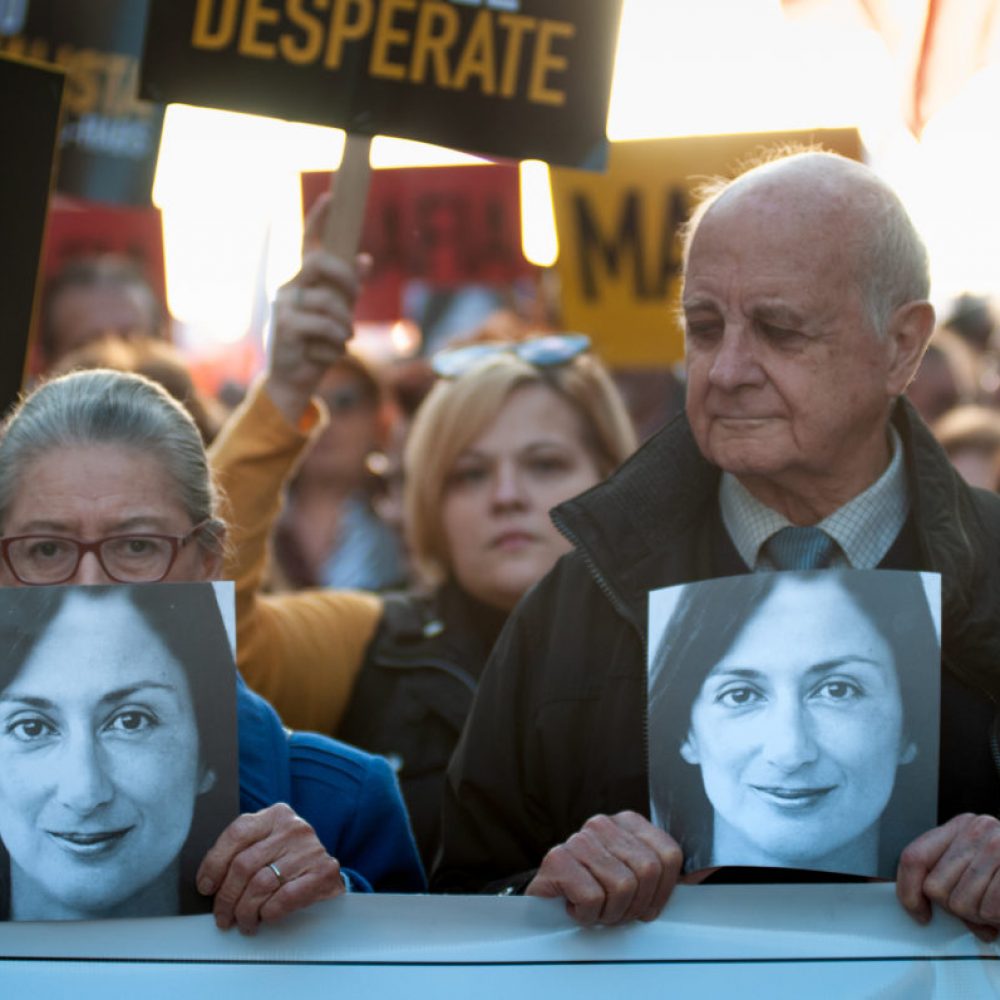Malta is a haven for corruption and money-laundering. That’s the message we’re getting from the public inquiry into the killing of journalist Daphne Caruana Galizia.
But according to every government insider who’s been called to testify, no one seems to be responsible for it.
Finance Minister Edward Scicluna was the most recent member of Cabinet to point his finger at the powerful inner circle that surrounded disgraced former prime minister Joseph Muscat when he appeared before the public inquiry this week.
“Everyone knows about the closeness of Keith Schembri and the then prime minister,” he said, referring to the businessman who was Muscat’s chief of staff. “They were one and the same team.”
A close childhood friend of the prime minister who had no public profile, Schembri was seen as the hidden brains behind Labour’s 2013 election strategy. When Muscat won with the largest ever majority in Malta’s post-independence period, he created the chief of staff position for Schembri and gave him an office down the hall.
The businessman kept a low profile for the first couple of years, until April 2016, when Daphne revealed that Schembri and star minister Konrad Mizzi had opened secret Panama companies within hours of winning the election.
Their names made headlines around the world, but rather than remove the two men, Muscat chose to defend them.Politicians around the world resigned for being exposed in the Panama Papers, but not in Malta.
“There were a lot of explanations and attempts at explaining away what happened,” the Finance Minister told the pubic inquiry. “The majority of the parliamentary group were advising the PM to distance himself.”
Scicluna claimed he had insisted they step down, but when the Opposition called for a vote of confidence in parliament, the entire Cabinet backed Mizzi, including the Finance Minister.

“It was either vote in favour or resign,” he said, justifying his decision by pointing out that he’d left a lucrative job in Brussels to enter local politics. “Why should I resign if someone else did wrong?”
Would things have gone differently if Scicluna and his colleagues hadn’t set aside their self-professed principles in favour of self-interest?
Mizzi was stripped of his ministerial portfolio in the wake of the scandal, but rather that twiddle his thumbs on the back benches, he was taken directly under Muscat’s wing as “Minister Within the Office of the Prime Minister” and put in charge of Projects Malta.
This new entity had been set up to oversee public-private partnerships across economic sectors ranging from large infrastructure projects to tourism, and it seemed to be tailor-made for Mizzi.
A series of “sinister” deals, as the Council of Europe defined them, was soon to follow, from the Electrogas agreement involving Azerbaijan and Malta’s leading business families to the transfer of prime public land to the American University of Malta, which wasn’t a university or even American. It was owned by a Jordanian construction magnate.
Every time Daphne exposed a new scam, it seemed to have Mizzi’s signature on the contract. The agreements he signed were never tabled in parliament. The Opposition couldn’t see them, the government claimed, because of “commercial sensitivity”.
Despite Scicluna’s attempts to distance himself from the scandals, none of these projects could have moved forward without the cooperation of the Finance Ministry.
At the time of her death, Daphne was working through a massive cache of documents from the Electrogas power station that had been sent to her by a whistleblower. The project was linked to accused mastermind Yorgen Fenech’s Dubai company – 17 Black – and to the Panama company structures set up by Schembri and Mizzi.
When questioned about Electrogas by the panel of judges at the public inquiry, the Finance Minister claimed he’d never been involved in the negotiations. “I only put my signature to the guarantee for a bridge loan,” he said, insisting everything else had been handled by Projects Malta.
Judge Abigail Lofaro, one of three judges on the Board leading the public inquiry, pointed out that if a collective decision is taken by Cabinet, all members are responsible for it.
“We pass money to ministries,” Scicluna replied. “My ministry received a minute from the PPS, and must act on it. It must follow the direction of the government.”
In other words, he was just following orders.
The minister who held the purse strings of government and controlled fiscal expenditure admitted he’d been concerned that a group of powerful lawyers and consultants — part of what he called the “Kitchen Cabinet” forming Muscat’s inner circle — seemed to be leading the negotiations. But he blamed structural deficiencies for his ‘inability’ to do anything about it.
“Projects Malta, I can say, was not transparent. It was something we were experiencing regularly. The data would eventually come but you would require great effort to acquire it.”
Scicluna gave similar excuses for not intervening in the controversial Vitals Global Healthcare project, where a conglomerate with no prior experience in the healthcare field was given a lucrative deal to run three public hospitals. This, too, was orchestrated by Mizzi’s Projects Malta.
He would have done things differently if he was in charge, Scicluna claimed.
“On VGH, from what I saw in the NAO report, they are those type of people, who, when I was a consultant in private practice, I would suggest keeping away from.”
But it was easier to just allocate what he was told to allocate. On paper, due diligence was the responsibility of the ministry involved; in this case, the health ministry.
“Whoever wants to hijack a system, it is that person who is responsible,” Scicluna said, washing his hands of personal responsibility. “I am not.”
The courts seem to think otherwise. In the wake of a major investigation by The Shift into VGH, the courts have ordered a magisterial inquiry into the role played by Scicluna, Mizzi and former Economy Minister Chris Cardona.
In their submission to court to argue against a magisterial inquiry, the three ministers dedicated a page to discrediting The Shift’s editor, Caroline Muscat, saying the findings were the result of an “agenda” against the Party in government, rather than fact. The government and its components continue to blur the lines between Party and State while ignoring the duty of the journalist to hold power to account. Scicluna was part of this, despite his efforts to distance himself from corrupt deals now.
A report by the Auditor General published last month proved the findings by The Shift were correct, saying the deal was the result of “collusion” and that it was “predetermined” that Malta’s public hospitals would go to shady people with no track record in hospital management.
Scicluna’s attempts to blame systemic corruption on a powerful inner circle around the disgraced former prime minister echoed earlier testimony from Foreign Minister Evarist Bartolo, who told the public inquiry that Schembri had led a shadow government which exerted power over Muscat.
In an interview with DW Conflict Zone earlier this year, Bartolo shocked veteran journalist Tim Sebastian where he explained away Malta’s failure to prosecute a single case of high level corruption by saying: “The rule of family and the rule of friends is stronger than the rule of law.”
Every government official who has testified before the public inquiry had a similar story to tell.
They weren’t responsible for any of the dark deals that spread through all levels of government under the former Prime Minister. They saw nothing and heard nothing. They simply cashed their pay cheques and minded their own ministerial backyards.
As for Muscat’s disgraced former chief of staff, Schembri issued a two-page sworn statement in response to the accusations levelled by his former colleagues.
“I’m now used to the fact that there are people who have a vested interest in besmirching my name and involving me in things that were never in my control or that I never had anything to do with.”
Schembri’s name has come up repeatedly in the compilation of evidence against alleged mastermind of Daphne’s assassination, Yorgen Fenech, and in the secret tapes recorded by murder middleman turned State witness Melvin Theuma.
But like Mizzi, who signed the deals that corrupt elements of this government allegedly benefitted from, Schembri was protected by Muscat.
They would all fall together when Fenech’s arrest sparked weeks of street protests that shut down the country. But all three men remain at large, and Muscat and Mizzi are still Members of Parliament. There are men in the dock, but those pulling strings remain free.
Each new hearing of the public inquiry has revealed that the sense of personal responsibility is in shamefully short supply.
It’s easy for government insiders like Scicluna and Bartolo to distance themselves from the corruption and impunity that killed Daphne. But while they may not have committed any direct crimes, they’re all guilty of turning a blind eye in order to remain in power.
As another week of testimony comes to a close, justice for Daphne feels very far away.

Photo: Pierre Ellul
The following project is weekly Maltese Roundups prepared by The Shift News (Malta) offering the latest news in Daphne Caruana Galizia case.

